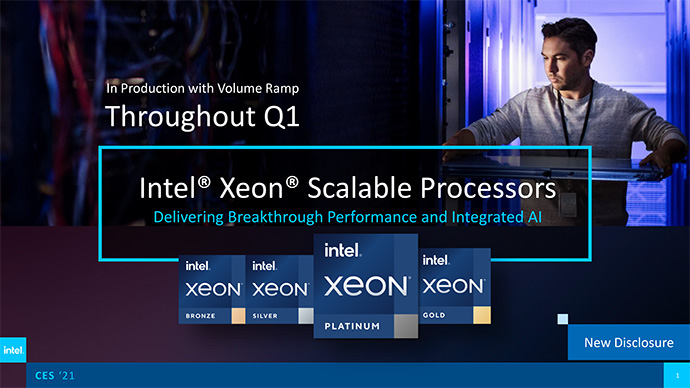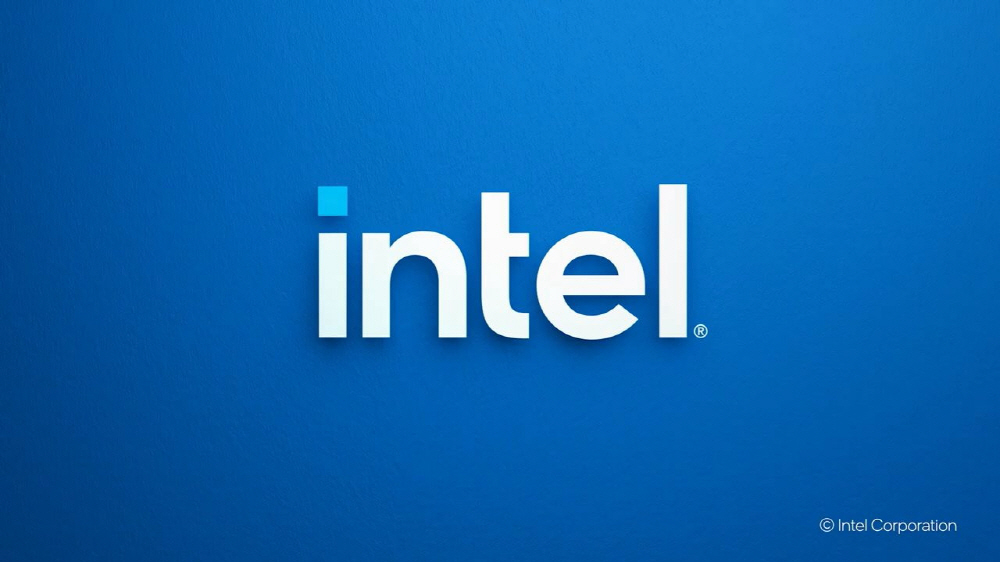
During the CES 2021, an online IT home appliance exhibition held due to the influence of Corona 19, Intel made an announcement about the 11th generation processors scheduled to be released in 2021. It also briefly introduced the Alder Lake series of next-generation processors.
First, Ice Lake Xeon production begins. The Intel Xeon series, CPUs for data centers with Ice Lake micro-architecture, have already started production and will appear on the market in the first quarter of 2021.
The next is that the 11th generation Intel Core i5 and i7 will appear supporting vPro for business. Intel has announced the 11th generation core for mobile notebooks corresponding to the business platform VPro. The core processor for notebooks with the Tiger Lake microarchitecture was announced in August 2020, but this announcement was focused on business. It emphasizes that it has higher security performance than its rival AMD CPU. Not only that, but for the same reason, Office 365, video conferencing, and video editing are speeding up.
In addition, the Intel Evo platform that integrates the Tiger Lake Core processor supporting VPro and Intel Iris Xe graphics will also appear. It also announced Intel Pentium Silver and Celeron, which increased the performance by 35% compared to the previous generation by adopting a 10nm manufacturing process as the N series targeting the education market. The development code name is Jasper Lake, and it supports Wi-Fi 6 and noise canceling.

Next is the 11th generation Intel core, the Rocket Lake-S series. Intel has reiterated that the Rocket Lake-S series will appear in the first quarter of 2021. The appearance of the Rocket Lake-S series has already been announced in October 2020.
New core architecture engine, game optimization, PCI Express 4.0×20 lanes, and AI features support Intel Deep Learning Boost, which speeds up deep learning, but no new information has been released compared to October 2020. .
Next is the 11th Gen Intel Core Tiger Lake H series for notebooks. It is announcing the Tiger Lake H series, the 11th generation Intel core for gaming laptops that also put 4K games into sight. Tiger Lake H5 series adopts 10nm manufacturing process and supports PCI Express 4.0 with up to 8 cores.
Tiger Lake H series has TDP 35W, Taguire Lake H35, which has three models: Core i7-11375H, Core i7-11370H, and Core i7-11300H. Also, he did not disclose details, but made it clear that the Tiger Lake H45 series, which is a TDP 45W, is also being developed.
Next is the 12th-generation Alder Lake series. Intel has also released some information about Aller Lake, a 12th-generation CPU scheduled to appear in late 2021. Alder Lake is a core architecture with higher performance and power efficiency than before by adopting a 10nm SuperFin manufacturing process. Related information can be found here .
Meanwhile, Mobileye, an Intel subsidiary that develops automotive-related technologies, announced that it will conduct self-driving vehicle tests in New York, Paris, Shanghai and Tokyo in line with CES 2021.
Mobileye is a company that develops technologies related to autonomous driving based on REM (Road Experience Management) that automatically generates high-precision maps, common sense behavioral characteristics that human drivers regard as safe driving, and three detection systems through rider technology.
The Mobile Eye autonomous driving system uses 8 cameras, 12 ultrasonic sensors, and a front radar along with an on-board computer. The autonomous driving system developed by MobileI is proven to be capable of detecting traffic lights and signs, and can drive completely autonomously at intersections. However, there is a weakness in that only areas mapped with REM are possible for autonomous driving areas. In addition, Mobileye claims that it has already mapped more than 7.5 billion km of roads and plans to increase the area where autonomous driving is possible by mapping more than 1 billion km of roads daily by 2024.
Mobileye announced the schedule of driving tests using its self-driving vehicle at the CES 2021 keynote. In 2020, it started testing autonomous vehicles in Munich, Germany and Detroit, USA, but it plans to expand its range to four cities in New York, Paris, Shanghai and Tokyo by 2021. These cities conduct driving tests using REM on public roads, but in New York, it is still unclear whether the tests will be conducted as they are in the review stage.
Mobileye also announced that it is positing that autonomous vehicles will enhance detection and sensing based on wireless or light. To this end, it has announced an SoC for lidar systems that will be a new imaging radar technology sufficient to support autonomous driving. This SoC is capable of advanced digitized signal processing, various scan modes, rich RAW detection, and multi-frame tracking, and can realize dramatic performance improvements. According to the description, an autonomous vehicle equipped with a new SoC for the lidar system will be able to recognize 500,000 detections per second. SoCs for lidar systems are expected to enter the market in 2025.
Mobileye also announced that it will introduce EyeQ6, the next-generation chip of the EyeQ series, a camera image analysis chip, in 2023. IQ 6 is expected to be manufactured through TSMC 7nm manufacturing process.
In addition, Mobili also announced plans to build a dispatch service using autonomous vehicles in connection with the Israeli transportation app (Moovitp). Mobileye aims to start the service by introducing more than 100 vehicles in three countries, Israel, France and Korea by 2022. In addition, it is expected to be about $10 to 20,000 per self-driving vehicle to be used for the service, and it is expected to be equipped with a Mobile Eye lidar sensor. Related information can be found here .


















Add comment